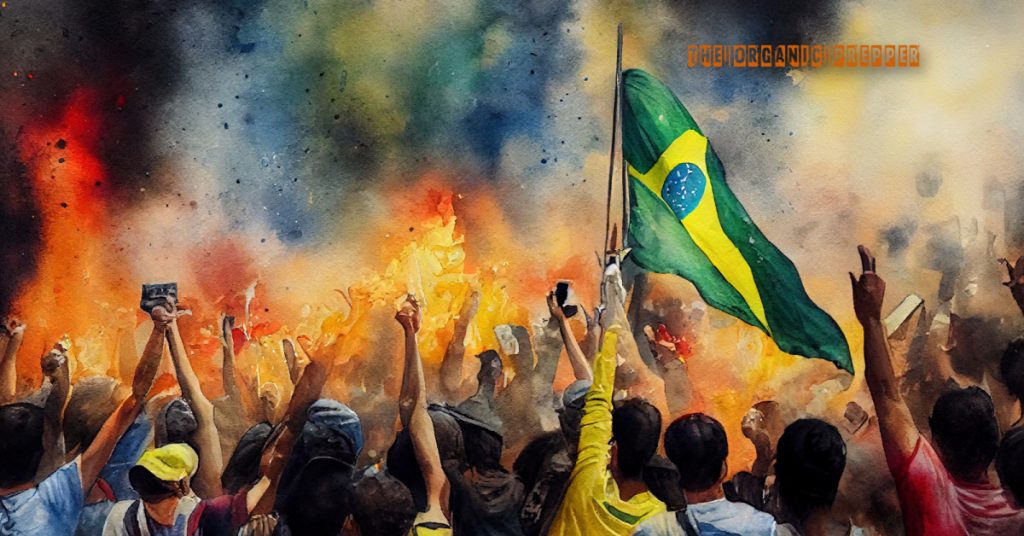by Daisy Luther, The Organic Prepper:

Less than 24 hours after the results of the Brazilian election and presidential runoffs were announced, protests erupted and spread like wildfire in the streets and highways of cities nationwide. Is Brazil on the verge of revolution or mayhem?
Videos of massive gatherings of people covered in national flags swarming the streets of major cities and unending rows of trucks blocking roadways and avenues went viral this week. Those following news on social or mainstream media might think Brazil went on a tailspin of social unrest.
TRUTH LIVES on at https://sgtreport.tv/
But no, there’s no revolution, much less civil war on the horizon.
These have been tense days, with continued protests, calls for general strikes, and frenzied political articulation. Since the rallies have been nonviolent for the most part, I went out into the streets to see, hear, and feel what is happening and where we’re going from here.
I can attest the sentiments of apprehension, frustration, and revolt are legit, and there are grounds for concern.
Here’s an account of what really happened in the Brazilian election.
After a highly tense, divisive, and contentious campaign, incumbent right-wing Jair Bolsonaro lost the presidential runoffs on Sunday, Oct. 30, to former leftist president Luis Inácio “Lula” da Silva by a razor-thin margin (1.8%).

Brazil’s voting process is entirely electronic, and the results were announced in the afternoon, hours after the election ended. Almost immediately, truck drivers shut down motorways – more than 200 all over the country. On Tuesday, right-wing activists swarmed the streets of all 27 states’ major and minor cities.
The movement started spontaneously and appeared to have no clear, organized leadership or backing. Though I wouldn’t be shocked if that was the case: there are no power vacuums nor innocents in politics.
Although there is no official count, estimates talk about hundreds of thousands in larger centers and millions across the entire nation. The images are impressive indeed, showing huge and agitated crowds. Peace prevailed, though, with only isolated incidents of violence and shortages, thankfully nothing serious or long-lasting.
I’m glad to report that things are normal right now, or as normal as they can be in 2022.
The mayhem and apocalypse are only taking place in the news and on social media. Everything “real” is up and running: supermarkets, parks, stadiums, colleges, offices, gyms, farms, and factories. People are working, studying, dining out, and jogging (and preparing for the World Cup, which begins in a few days. After all, Brazil is the “nation of soccer.”)
In other words, it hasn’t hit the fan.
But the situation is far from normal. Despite attempts by some official sectors with the collaboration of MSM to stifle dissent and keep the general public in the dark about the ongoing demonstrations, tension and discontent are palpable.
It took Bolsonaro nearly 48 hours after the results were announced to deliver his address, which did little to appease his supporters and the 58 million who voted for him. While not openly conceding, he never put up a fight or even came close to calling a coup, as his critics had predicted he would in case Lula won.
He was contained and circumspect to avoid fanning the flames of his supporters, deeming the protests “democratic and legit” but calling for the blockades to end at the same time. Bolsonaro reaffirmed his respect for the Constitution, stating many times he would play by the rules. Finally, he kickstarted the transition process.
It wasn’t a resounding victory for Lula.
Far from it, actually, and here’s why: voting is compulsory for eligible citizens living in Brazil or abroad, which means a universe of 156 million voters. Lula’s 60 million mean only 38% of the voting population actually supports him. That’s significant – and there’s no second place in politics – but still uncomfortably low for a newly elected president.
It spells significant opposition and a very short honeymoon for Lula and his allies going into 2023 and beyond, especially if the economy worsens (which has a very high probability of happening, as we all know).
Bolsonaro doesn’t have much going for him, either, having conquered only about 36% of valid ballots by the same calculations. In other words, when taking into account those who either abstained or canceled their vote, it becomes evident that neither candidate had significant support among the electorate and general population.
The logical conclusion? If Bolsonaro had taken the presidency on Sunday, we’d be witnessing the other part of the population protesting in the streets instead.
That means people are weary, uninspired, and unsatisfied with the feeble, mediocre, dishonest, and inept leadership – from both sides. Which explains in good part the political polarization, extremism, and division.
Objectively, Bolsonaro has some positive economic statistics and achievements to show for him, but few were paying attention or felt moved by these. He wasn’t able to connect his accomplishments to his controversial figure and conquer support beyond his core constituency, to the point where voters chose to reinstall a known populist ex-convict with hanging charges instead of giving the incumbent a second term.
We can protest in droves against the lack of transparency while shouting at the top of our lungs about fraud and manipulation. Whether A or B wins, whether turnout is 100% or 10% – no outcome will be satisfactory because people no longer have faith in the system or the leadership. And these don’t give two craps for the wants and needs of the population, either.
Read More @ TheOrganicPrepper.ca



